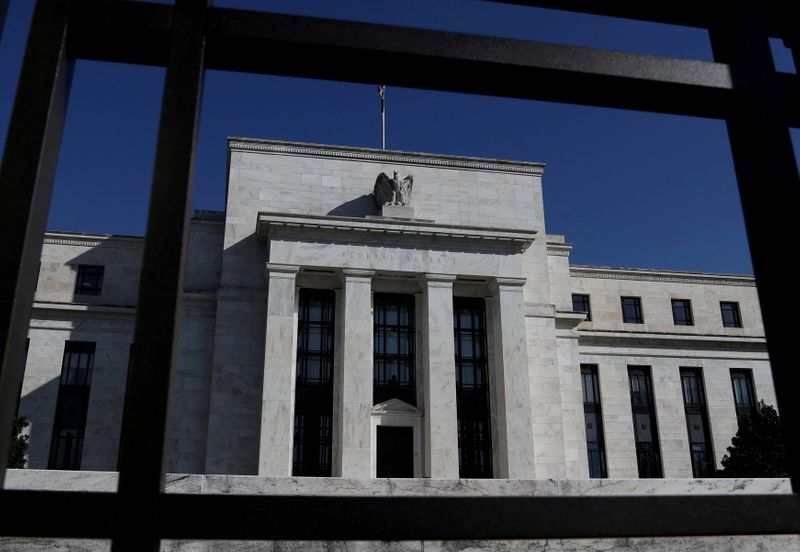By Jamie McGeever
ORLANDO, Fla. (Reuters) - A flattening yield curve and slumping consumer confidence have been warning for months that U.S. recession risks are rising, but the alarm bells are suddenly being amplified by a rare quirk in the interest rate futures market.
In technical terms, the June 2023-December 2023 Eurodollar curve has inverted. In plain English, traders are beginning to price in Federal Reserve interest rate cuts in the second half of next year, before the tightening cycle has even started.
This inversion had previously been seen further out the curve, into 2024. But that was before war in Europe, eye-watering surges in oil, gas, and commodities prices, and cratering global markets radically shifted the dial.
To be sure, the Eurodollar curve is not a pure snapshot of the Fed's expected policy path. It can be distorted by perceived credit risk and strong hedging demand from a wide range of players, including overseas sovereigns.
But as Joseph Wang, a former trader on the Fed's trading desk points out, it is unusual, and merits attention.
"This is rare, but we have rare events going on. There is a huge amount of uncertainty," Wang said. "The core of the financial system, banks, will be fine. But there is definitely concern about contagion and there could be reverberations that people are not familiar with."
FCI, 6-YEAR HIGH
Could the U.S. economy fall into recession next year, or even this year? Economists are lowering their 2022 growth forecasts closer to 3% from 4% at the start of the year, with risks still to the downside in large part due to oil. Average gas prices at U.S. pumps are now the highest ever.
Annual growth of 3% would be nowhere near contraction. But global geopolitical and financial developments are unfolding so quickly there is precious little visibility for the coming weeks, never mind the rest of the year and beyond.
Global financial conditions are now the tightest in six years, according to Goldman Sachs (NYSE:GS)'s Global Financial Conditions Index. Higher long rates, wider credit spreads, lower equities have all contributed to the rapid tightening this year.
The U.S. economy's direct exposure to Russia, Ukraine and Eastern Europe is small. The euro zone, for example, will be hit much harder by the raging conflict and energy prices.
But U.S. consumer confidence has plummeted to a 10-year low, and the 10-year Treasury yield is only 20 basis points away from going below the two-year yield. Every U.S. recession in the past 40 years has been preceded by a big fall in consumer confidence and an inversion of the yield curve.
BEAR MARKET
While high and rising inflation was on everyone's radar at the start of the year, no one had recession in their 2022 play book.
"Markets should focus on the growth outlook and the rhythm of its deceleration rather than on inflation risk, which is already priced into the bond and commodities markets," Unigestion's Guilhem Savry wrote on Tuesday.
A rosy growth outlook at the turn of the year was one of the pillars on which the equally bullish and broad-based 2022 equity market consensus was built.
A cursory look back through Wall Street banks' 2022 outlooks shows the 'R' word was hardly mentioned. Yes, earnings growth might slow and valuations looked a bit rich, but as long as the economy avoided recession Wall Street would climb another 10% or so.
Bank of America (NYSE:BAC) research highlights the extent of investors' economic optimism and market bullishness back in January: the gap between bullish equities and bearish bonds sentiment was historically wide, only 7% of investors expected recession this year, and less than a third expected a bear market this year.
More astonishing of all, BofA found that a record $949 billion flowed into global equity funds last year, more than the past 20 years combined.
Even assuming some of that flow naturally evaporates as Wall Street heads lower - the Nasdaq became a bear market this week - and most of it stays invested, there is still potential for huge relative value shifts or reallocation into safer assets.
"We are firmly in the grasp of a bear market that is incomplete in both time and price," Morgan Stanley (NYSE:MS)'s equity strategists wrote on Monday, adding: "As such, we recommend staying defensively oriented by running less risk than normal."
(The opinions expressed here are those of the author, a columnist for Reuters.)
(By Jamie McGeever, with additional contribution from Mike Dolan; Editing by Andrea Ricci)
